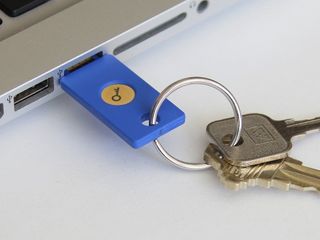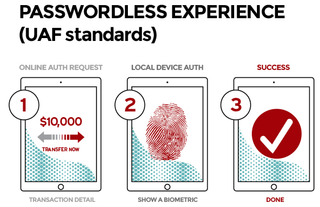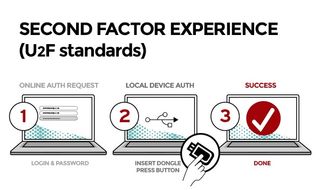FIDO Authentication Standards See Explosive Growth In 2016

The Fast Online Identity (FIDO) Alliance said it saw a 200% increase in approved certifications for its Universal Authentication Framework (UAF) and Universal 2nd Factor (U2F) standards. Both standards aim to replace passwords with solutions that are easier to use and make devices more secure by default.
UAF Standard
UAF is the FIDO alliance's main standard. It mostly relies on biometric profiles, such as a fingerprint, a face, or a retina scan, to work. Its goal is to replace passwords and thus make it easier for people to unlock their devices or login to websites.
This may not turn out to be a good idea in the long term, especially as governments start to use biometrics as IDs. Until then, however, they're also far more convenient than passwords. If you consider the fact that most people don’t use password managers and reuse passwords that can be stolen in one data breach or the next, they offer potentially better security as well.

Beyond biometric authentication methods such as authentication via fingerprint, face or iris scans, as well as voice identification, UAF also supports PINs. It will soon be extended to support logging in to websites via a public key cryptography mechanism tied to the PIN or biometric authentication used on the local device. This is based on Microsoft’s “Hello” authentication protocol for websites.
U2F Standard
The U2F standard aims to replace the One Time Password (OTP) codes used now by SMS and app-based authentication mechanisms, as well as by the older hardware tokens.

U2F also works via a public key cryptography mechanism and it’s been adopted by hardware tokens such as the latest Yubikeys as well as Intel’s Kaby Lake chips.
New Certifications
The FIDO Alliance said the latest companies to receive a FIDO certification include:
Stay on the Cutting Edge
Join the experts who read Tom's Hardware for the inside track on enthusiast PC tech news — and have for over 25 years. We'll send breaking news and in-depth reviews of CPUs, GPUs, AI, maker hardware and more straight to your inbox.
certSIGNEyeVerify Feitian Technologies Co., Ltd.i-Sprint Innovations Pte LtdIntelIRISYS Co., Ltd.Jilin University Information Technologies CO., LTD.NBREDS openit Inc.SK Telecom ubivelox
The latest round of certifications also marked a first in the FIDO standards’ history: Intel and Synaptics brought FIDO biometric authentication for the first time to Lenovo notebooks.
The FIDO Alliance said that new certification programs covering new specifications should be available in 2017. Companies looking to adopt the FIDO authentication standards and test for them can register on the FIDO Alliance website.
-
techy1966 It is all great until something goes very wrong and you are locked out of your device or accounts. I am all for progress but it seems for every step forward these days we have to take 2 steps backwards by giving up something else. Not just referring to this but pretty much anything tech related.Reply -
kittle biometrics SOUND nice until somebody steals your credentials.Reply
I can easily change my password if it gets compromised. I cant change my fingerprint or retina pattern.
Most Popular


